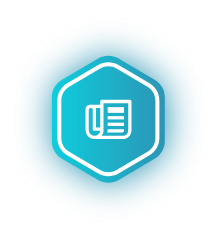How to interview someone for a job; tips and advice
Author: IntaPeople | Date published: 30/07/20


Interviewers often have little or no training around how to interview someone for a job and the questions to ask a candidate in an interview. If you’re a hiring manager responsible for interviewing candidates, we have you covered with our helpful interview tips.
A job interview is a two-way process, as much as you want to make sure the candidate is the right fit for your business it’s also an opportunity for the interviewee to find out more about the position and your company, to ensure it’s the right match for them too.
With the cost of a bad hire reaching £132,000, for a mid-manager with a £42,000 salary, getting your recruitment right is vitally important. However, hiring managers aren’t always given training on conducting interviews; as well as causing unnecessary stress for the interviewer it can also have a negative impact on the candidate, which in turn affects their impression of the organisation.
How to interview someone for a job
Just like you would expect a candidate to be prepared for the interview it’s important you are thoroughly prepared too. If a candidate has a bad interview experience, the negative word-of-mouth could have a knock-on effect when attracting other candidates in the future as your employer brand reputation is damaged.
Almost 60% of job seekers say they’ve had a poor candidate experience; 72% of these shared information about it online on employer review sites, social networking sites, or directly with a colleague or friend.
So, what can you do beforehand?
- Ensure you have an appropriate meeting room available and the interview is booked in your calendar.
- Think about your reason for hiring and what you need from your staff, you can then use this to benchmark each candidate against your requirements.
- Plan a clear interview structure – not only will this allow you to stay on time and ensure you cover all the essentials, but it enables you to provide a consistent experience for all candidates.
- As part of your interview structure consider a tour or simple walkthrough of your premises, this can be a good conversation starter and can also be a selling point for candidates if your office has modern equipment or a relaxed break out area.
- Read the candidate CV beforehand; how will you ask intelligent questions and create compelling conversations when you don’t know a lot about each person ahead of time?
- Make sure you have a printed/digital version of their CV and the job description to refer to during the interview. You don’t want to appear disorganised fussing with the printer after they have arrived.
- Prepare your questions to test both their technical competency and soft skills.
Questions to ask a candidate in an interview
The best interviews are a conversation rather than an interrogation. While you want to have some questions or topics planned you need to listen to the candidate’s answers and respond with follow up questions e.g. How did that turn out? Why did this happen? Who was responsible for…? Why was something a success or failure? What did you learn from this?
Getting started
- Instead of ‘Tell me about yourself…’ you could start with something more specific e.g. “Your education and experience caught our attention. That’s why we wanted to meet you. Tell me something about your background that you feel we should know as we consider you for this position.”– This is a great ice-breaker, makes the candidate feel valued and allows them to talk freely about the things they think are important. Understanding a bit more about the candidate from the beginning can help the conversation flow more naturally too.
- What do you know about our company? Followed by why are you interested in working here? – This tells you a lot about whether the candidate has prepared in advance and how much they really want the job.
- What qualities do you think are most important for a developer/engineer/project manager etc.? – A question like this can reveal how the interviewee feels about the position and what and they think they would bring to it.
- Why are you looking to leave your current role? – This gives you a better understanding of the candidate’s motivations and whether they would be happier in this new position.
- Where do you see yourself in 5 years? – This helps you determine whether the candidate is likely to progress their career within the company or whether they will be looking for a different role in a year or two.
- What future technological innovations do you believe will have an impact on your job? – Discussing trends and advancements in the field will give you valuable insight into how the candidate perceives their role over the long term.
About the company
Set expectations from the start about what your company is like, what are the company mission and values? – While the candidate should have researched your organisation beforehand it’s helpful to explain in your own words what the company is like to work for. Remember you are trying to sell the company as an employer of choice, try to refer to aspects of the business that relate to the candidate’s motivations you have previously discussed.
About the role
Talk about the role, what they will be doing daily? Who do they report into? What does success in the role look like? – Think about whether there is any information or detail you can add on top of what is in the job advert or job description. While you want to provide extra insight to sell the position to the candidate, try to be concise as you don’t want to eat up too much time talking rather than listening.
Technical competency
When testing technical competency your questions need to be specific to the requirements of the role. Preparation is vitally important to ensure you don’t forget to cover any essential topics.
In which of your previous positions/past projects did you use/manage/implement {insert relevant task}? – This will allow you to gauge the candidate’s expertise with specific technologies or responsibilities, and enable you to ask follow on questions to delve into more detail about how things turned out, who was responsible for what, why something was a success or failure and what they learnt.
How they would approach {insert relevant problem likely to arise in their position}? – This can test a candidate’s technical expertise as well as their problem-solving ability.
How do you keep your skills current? – This can help you gauge the candidate’s enthusiasm for the profession, as well as open a conversation about professional development.
Pretend I’m not a tech person. Can you explain {insert relevant technology} in simple terms? – Not only does this allow you to assess the candidate’s communication skills, it helps you to determine how much they understand about the technology.
Describe a time when you worked in a group on your last technical project. – Depending on how much detail they provide this is a good open question to prompt further conversation about specific areas they mentioned.
Soft skills
Soft skills are personal attributes that enable you to interact well with other people e.g. communication, decision-making, collaboration, teamwork, time management, creativity etc. These are just as important as technical competency; all careers require at least some soft skills to make the hard skills valuable.
92% of talent professionals say soft skills matter as much or more than hard skills when they hire, and 80% say they’re increasingly important to company success.
– Tell me about a time when you were asked to do something you had never done before. How did you react? What did you learn? – This will give you a good insight into how adaptable the candidate is and whether they embraced the challenge.
– You turn on your PC/laptop and have 8 emails and 4 voicemails from clients before your day has even started, all with different urgent requests. What do you do? – It’s interesting to see how candidates respond to varying workloads/priorities and how they can manage their time.
– Tell me about a time when you failed. Why did it happen? What did you do next and what would you do differently if given another chance? – A strong candidate will be able to think critically about themselves and reflect on what they learnt from the situation that they can implement in the future.
– You know your manager is 100% wrong about something. What do you do?/Your team members are quitting one after another. What do you do? – Depending on the seniority of the role you can ask questions about they handle management situations or how they cope working with management.
Wrapping up
– What questions do you have for us? – You would expect a candidate to have some further questions, either things you haven’t covered already or asking for you to expand in more detail something you previously mentioned.
– Next steps – Be clear about the next steps, is there another interview stage or will you be looking to make an offer? What are the timescales? It is worth remembering the longer you take to decide the higher the chance your ideal candidate will have accepted an offer elsewhere; 54% of HR directors have lost out on a qualified candidate due to a long hiring process.
Interviewer dos and don’ts
DO prepare thoroughly and read the candidate’s CV beforehand
DO welcome the candidate; introduce yourself and all interviewers
DO take the candidate on a walkthrough or tour of your premises if appropriate
DO create a welcoming environment to put the candidate at ease and offer them a drink
DO explain how your interview process works, e.g. the kinds of questions you’ll ask, any tests or assignments you’ll request etc.
DO take a deep breath, relax, and get to know the candidate
DO engage the candidate using strong and confident eye-contact
DO allow the candidate time to respond; don’t be afraid of silence
DO clarify what the next step is e.g. another interview, an email or a sample task.
DO thank the candidate for their time, expressing appreciation for their interest in your company and the job
DON’T interrogate the candidate, while you want to ask questions try to make it a conversation rather than a quiz
DON’T ask candidates to work for free e.g. asking candidates to code or design something which you later go on to use
DON’T ask goofy interview questions e.g. If you were a song/chocolate bar/animal {insert miscellaneous topic}, what would you be? This kind of question might have a place at a fun team building event but doesn’t add any value in a job interview. It could even give the candidate the impression you aren’t taking the interview seriously
DON’T ask illegal questions. This seems obvious but sometimes well-meaning questions aren’t worded in an appropriate way e.g. you can’t ask ‘Are you a UK citizen?’ but you can ask if a candidate is legally entitled to work in the UK. Other illegal topics include race, religion, age, marital status, children, sexual preference etc. Find out more about preventing discrimination here.
DON’T burn bridges, if the candidate is a poor fit for the job, treat them with the same respect as every other interviewee.
If you’re a hiring manager getting ready to interview technical candidates and you want some interviewing advice or tips on streamlining your recruitment process and reducing your time to hire, please get in touch.
